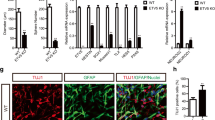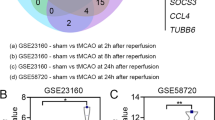Abstract
We previously demonstrated that proliferation of endogenous neural progenitor cells is enhanced by cerebral ischemia and that phosphatidylinositol 3-kinase (PI3-K)/Akt-dependent glycogen synthase kinase (GSK)-3β signaling is involved in ischemia-induced neurogenesis. It is important to learn more about the regulation of proliferation and differentiation of neural progenitor cells under ischemic conditions, as such knowledge that may serve as the basis for the development of new therapeutic approaches for stroke. However, it remains to be addressed whether a change in that signaling pathway is induced in neural progenitor cells. We prepared neural progenitor cells by using the neurosphere method and conducted experiments to determine the relative contributions of the PI3-K/Akt-dependent GSK-3β signaling pathway to the proliferation and differentiation of neural progenitor cells under the hypoxic condition in vitro. We showed that hypoxic exposure induced the proliferation of neural progenitor cells. This proliferation was accompanied by phosphorylation of Akt and GSK-3β at its Ser9. Furthermore, treatment with a PI3-K inhibitor decreased the hypoxia-induced phosphorylation of GSK-3β and proliferation of neural progenitor cells. Furthermore, hypoxic exposure enhanced the differentiation of neural progenitor cells, and this increased differentiation was not affected by treatment with the PI3-K inhibitor. Although the expression of NeuroD1 mRNA during cell differentiation was also enhanced by hypoxic exposure, this increased expression was not affected by treatment with the PI3-K inhibitor. Our findings suggest that the PI3K/Akt-dependent GSK-3β signaling pathway was involved in the proliferation of neural progenitor cells under a pathologic condition, such as hypoxia and/or cerebral ischemia in vivo.





Similar content being viewed by others
Abbreviations
- GSK:
-
Glycogen synthase kinase
- PI3-K:
-
Phosphatidylinositol 3-kinase
- SGZ:
-
Sub-granular zone
References
Mochizuki N, Takagi N, Onozato C, Moriyama Y, Takeo S, Tanonaka K (2008) Delayed injection of neural progenitor cells improved spatial learning dysfunction after cerebral ischemia. Biochem Biophys Res Commun 368(1):151–156
Kawai T, Takagi N, Miyake-Takagi K, Okuyama N, Mochizuki N, Takeo S (2004) Characterization of BrdU-positive neurons induced by transient global ischemia in adult hippocampus. J Cereb Blood Flow Metab 24(5):548–555. https://doi.org/10.1097/00004647-200405000-00009
Arvidsson A, Collin T, Kirik D, Kokaia Z, Lindvall O (2002) Neuronal replacement from endogenous precursors in the adult brain after stroke. Nat Med 8(9):963–970
Parent JM, Vexler ZS, Gong C, Derugin N, Ferriero DM (2002) Rat forebrain neurogenesis and striatal neuron replacement after focal stroke. Ann Neurol 52(6):802–813
Kisoh K, Hayashi H, Itoh T, Asada M, Arai M, Yuan B, Tanonaka K, Takagi N (2016) Involvement of GSK-3beta phosphorylation through PI3-K/Akt in cerebral ischemia-induced neurogenesis in rats. Mol Neurobiol 54:7917–7927. https://doi.org/10.1007/s12035-016-0290-8
Chae JH, Stein GH, Lee JE (2004) NeuroD: the predicted and the surprising. Mol Cells 18(3):271–288
Miyata T, Maeda T, Lee JE (1999) NeuroD is required for differentiation of the granule cells in the cerebellum and hippocampus. Genes Dev 13(13):1647–1652
Moriyama Y, Takagi N, Tanonaka K (2011) Intravenous injection of neural progenitor cells improved depression-like behavior after cerebral ischemia. Transl Psychiatry 1:e29. https://doi.org/10.1038/tp.2011.32
Mochizuki N, Takagi N, Kurokawa K, Kawai T, Besshoh S, Tanonaka K, Takeo S (2007) Effect of NMDA receptor antagonist on proliferation of neurospheres from embryonic brain. Neurosci Lett 417(2):143–148
Yuan B, He J, Kisoh K, Hayashi H, Tanaka S, Si N, Zhao HY, Hirano T et al (2016) Effects of active bufadienolide compounds on human cancer cells and CD4+CD25+Foxp3+ regulatory T cells in mitogen-activated human peripheral blood mononuclear cells. Oncol Rep 36(3):1377–1384. https://doi.org/10.3892/or.2016.4946
Zhang J, Kang N, Yu X, Ma Y, Pang X (2017) Radial extracorporeal shock wave therapy enhances the proliferation and differentiation of neural stem cells by notch, PI3K/AKT, and Wnt/beta-catenin signaling. Sci Rep 7(1):15321. https://doi.org/10.1038/s41598-017-15662-5
Goncalves JT, Schafer ST, Gage FH (2016) Adult neurogenesis in the hippocampus: from stem cells to behavior. Cell 167(4):897–914. https://doi.org/10.1016/j.cell.2016.10.021
Gao Z, Ure K, Ables JL, Lagace DC, Nave KA, Goebbels S, Eisch AJ, Hsieh J (2009) Neurod1 is essential for the survival and maturation of adult-born neurons. Nat Neurosci 12(9):1090–1092. https://doi.org/10.1038/nn.2385
Mochizuki N, Takagi N, Kurokawa K, Onozato C, Moriyama Y, Tanonaka K, Takeo S (2008) Injection of neural progenitor cells improved learning and memory dysfunction after cerebral ischemia. Exp Neurol 211(1):194–202
Cameron HA, Hazel TG, McKay RD (1998) Regulation of neurogenesis by growth factors and neurotransmitters. J Neurobiol 36(2):287–306
Chao J, Yang L, Yao H, Buch S (2014) Platelet-derived growth factor-BB restores HIV Tat-mediated impairment of neurogenesis: role of GSK-3beta/beta-catenin. Journal of neuroimmune pharmacology : the official journal of the Society on NeuroImmune Pharmacology 9(2):259–268. https://doi.org/10.1007/s11481-013-9509-x
O’Kusky JR, Ye P, D’Ercole AJ (2000) Insulin-like growth factor-I promotes neurogenesis and synaptogenesis in the hippocampal dentate gyrus during postnatal development. J Neurosci 20(22):8435–8442
Geranmayeh MH, Baghbanzadeh A, Barin A, Salar-Amoli J, Dehghan MM, Rahbarghazi R, Azari H (2015) Paracrine neuroprotective effects of neural stem cells on glutamate-induced cortical neuronal cell excitotoxicity. Adv Pharm Bull 5(4):515–521. https://doi.org/10.15171/apb.2015.070
Kim JS, Chang MY, Yu IT, Kim JH, Lee SH, Lee YS, Son H (2004) Lithium selectively increases neuronal differentiation of hippocampal neural progenitor cells both in vitro and in vivo. J Neurochem 89(2):324–336. https://doi.org/10.1046/j.1471-4159.2004.02329.x
Tiwari SK, Seth B, Agarwal S, Yadav A, Karmakar M, Gupta SK, Choubey V, Sharma A et al (2015) Ethosuximide induces hippocampal neurogenesis and reverses cognitive deficits in an amyloid-beta toxin-induced Alzheimer rat model via the phosphatidylinositol 3-kinase (PI3K)/Akt/Wnt/beta-catenin pathway. J Biol Chem 290(47):28540–28558. https://doi.org/10.1074/jbc.M115.652586
Giese AK, Frahm J, Hubner R, Luo J, Wree A, Frech MJ, Rolfs A, Ortinau S (2010) Erythropoietin and the effect of oxygen during proliferation and differentiation of human neural progenitor cells. BMC Cell Biol 11:94. https://doi.org/10.1186/1471-2121-11-94
Kuwabara T, Hsieh J, Muotri A, Yeo G, Warashina M, Lie DC, Moore L, Nakashima K et al (2009) Wnt-mediated activation of NeuroD1 and retro-elements during adult neurogenesis. Nat Neurosci 12(9):1097–1105. https://doi.org/10.1038/nn.2360
Bernis ME, Oksdath M, Dupraz S, Nieto Guil A, Fernandez MM, Malchiodi EL, Rosso SB, Quiroga S (2013) Wingless-type family member 3A triggers neuronal polarization via cross-activation of the insulin-like growth factor-1 receptor pathway. Front Cell Neurosci 7:194. https://doi.org/10.3389/fncel.2013.00194
Kim SE, Lee WJ, Choi KY (2007) The PI3 kinase-Akt pathway mediates Wnt3a-induced proliferation. Cell Signal 19(3):511–518. https://doi.org/10.1016/j.cellsig.2006.08.008
Ashton RS, Conway A, Pangarkar C, Bergen J, Lim KI, Shah P, Bissell M, Schaffer DV (2012) Astrocytes regulate adult hippocampal neurogenesis through ephrin-B signaling. Nat Neurosci 15(10):1399–1406. https://doi.org/10.1038/nn.3212
Funding
This research was supported in part by the Takeda Science Foundation.
Author information
Authors and Affiliations
Corresponding author
Ethics declarations
Conflict of Interest
The authors declare that they have no competing interests.
Rights and permissions
About this article
Cite this article
Kisoh, K., Hayashi, H., Arai, M. et al. Possible Involvement of PI3-K/Akt-Dependent GSK-3β Signaling in Proliferation of Neural Progenitor Cells After Hypoxic Exposure. Mol Neurobiol 56, 1946–1956 (2019). https://doi.org/10.1007/s12035-018-1216-4
Received:
Accepted:
Published:
Issue Date:
DOI: https://doi.org/10.1007/s12035-018-1216-4




